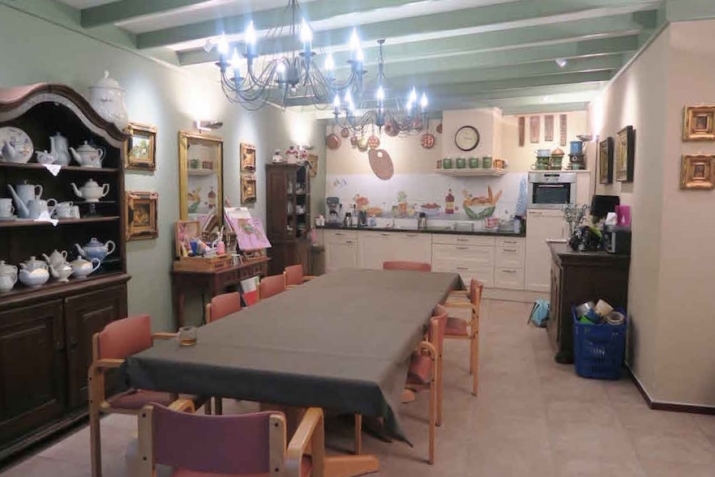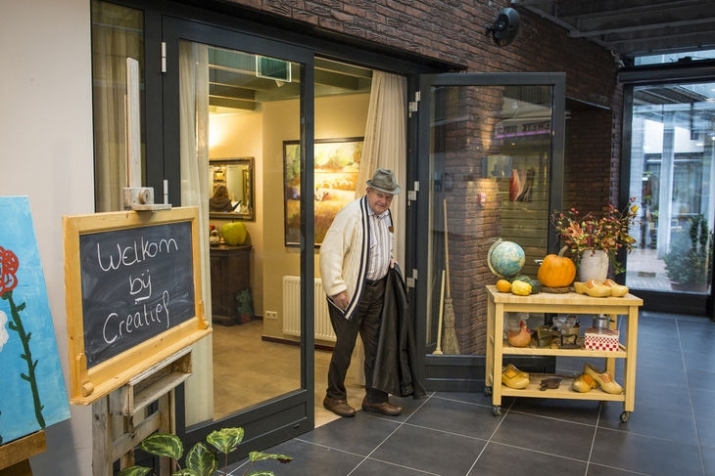NEWS
Dutch Home for Dementia Sufferers Provides Simulation of Normal Life
 A house in Hogeweyk. From inhabitat.com
A house in Hogeweyk. From inhabitat.comMost of us tell white lies at some point or another. In extreme cases, we find ourselves simulating normality for someone whose psychological state is not grounded in the everyday. A home for sufferers of extreme dementia in The Netherlands has done exactly this. In 2009, Hogewey Care Centre constructed “Hogeweyk” for dementia patients to enjoy their lives in simulated normality while avoiding the issues that would arise for them in the “normal” world.
Hogeweyk is a specially designed community with 23 houses for 152 dementia-suffering seniors, deliberately constructed to function as a normal village. This “dementia village” tries to reduce conflict and confusion by providing a realistic yet “safe and non-threatening version of real life,” according to Hogewey information officer, Isabel van Zuthem. (Nodes of Ranvier)
According to the Hogeweyk website, residents live in in homes of six to eight people based on lifestyle preference and engage in everyday activities (such as washing and cooking) with health workers in attendance, many of whom also live in the village. Like any normal village, Hogeweyk has streets, gardens, a park, and squares. The Hogeweyk supermarket offers groceries, and there is also a restaurant, a theater, and a bar. Marianne Cezza observed on her psychology blog, Nodes of Ranvier, that there are no nurses in the village, but the health workers assume fictional personas such as neighbors or shop workers to help the residents function and stay safe. “For instance, if someone were to forget to pay at the mini-market, shop assistants would simply fix the payment with the health workers at the residential apartments,” she explained.
The reasoning is that dementia patients understandably become confused, upset, and frustrated to be constantly told that their perception of the world is incorrect. Reminding a patient of the “truth” of their circumstances could actually do more harm than good. Hogewey prioritizes well-being over “the truth,” although the simulated normality does not mean that the village is fake or that everything is a prop, since the amenities are real and functional. (Nodes of Ranvier)
 A shop in Hogeweyk. From folksonomy.co
A shop in Hogeweyk. From folksonomy.coHogeweyk features seven different lifestyle choices for residents, which correspondingly shape the aesthetic and atmosphere of the home they live in: urban, artisan, Indonesian, homey, Gooi (an imitation of a green, wealthy, and historic neighborhood around Hilversum), traditional cultural, and Christian. Related to this idea of simulated normality and personalized surroundings is “reminiscence therapy,” which aims to recreate former personal environments and aid dementia patients’ short-term memory by jogging their long-term memory through familiar music and objects, such as photographs.
“It isn’t about lying to anyone. But if a patient says they have to go and catch a bus, we can sit [with them] at the bus stop and say: ‘Tell us about the buses you used to catch,’ ” said Chris Taylor of Grove Care, a nursing home inspired by Hogeweyk in Winterbourne, Bristol. (Nodes of Ranvier) In this sense reminiscence therapy is not about facilitating an illusion, but providing a therapeutic outlet for dementia patients who are unable to function in the world.
Of course, this raises many ethical conundrums, not the least of which is whether it is moral to fake normality. Nodes of Ranvier asserts: “The idea is to view dementia differently, giving the 35 million people worldwide who suffer from dementia a chance to enjoy their current life more, rather than emphasis [sic] the life they no longer have and even increasing their distress and confusion.”
Since its founding, Hogeweyk has won or been nominated for various awards due to its approach to caring for dementia patients, including its unique design as a village environment.
See more
Hogeweyk
‘Alternative Reality’ Villages For Dementia Sufferers (Nodes of Ranvier)














